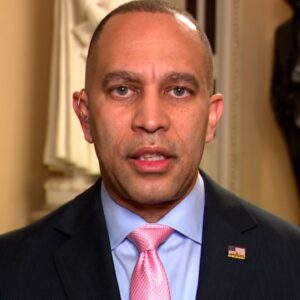The nomination of Kash Patel to lead the FBI has sparked intense debates on Capitol Hill and across the nation, highlighting the deep divisions over the future of federal law enforcement. With a career spanning national security, intelligence, and legal affairs, Patel has garnered both staunch support and fierce opposition, making his confirmation a central issue in the broader discussion about the role of politics in law enforcement.
Supporters of Patel’s nomination, particularly from conservative circles, argue that his extensive experience in intelligence and his close ties to former President Donald Trump make him uniquely qualified to reform an agency that has faced growing criticism in recent years. Law enforcement organizations, including several state-level police associations, have voiced their approval, citing his commitment to bolstering national security and ensuring accountability within the FBI. Many Republicans have echoed these sentiments, contending that Patel’s leadership could restore public trust in the agency, which they claim has been compromised by partisan bias and bureaucratic inefficiency.
On the other hand, Democratic lawmakers and civil rights organizations have raised significant concerns about Patel’s background and potential approach to leading the FBI. They point to his role in efforts to discredit investigations into Russian election interference and his involvement in the controversial handling of classified intelligence reports. Critics argue that his close political ties and history of challenging the intelligence community’s consensus could undermine the FBI’s independence, turning it into a tool for partisan objectives rather than an impartial law enforcement body. Many Democrats worry that Patel’s leadership could lead to increased political influence over federal investigations, potentially eroding the agency’s integrity.
The confirmation battle over Patel’s nomination also reflects the broader struggle over the future of America’s law enforcement institutions. In recent years, the FBI has found itself at the center of political controversies, from the handling of high-profile investigations to accusations of bias from both sides of the aisle. As public confidence in the agency wavers, the question of who should lead it—and how it should be reformed—has taken on new urgency.
During Patel’s confirmation hearings, lawmakers on both sides have pressed him on his views regarding the FBI’s role, his stance on political interference in investigations, and his plans for addressing internal challenges within the agency. While Patel has sought to assure senators that he would uphold the FBI’s mission without bias, his critics remain unconvinced. Many have pointed to his previous statements and actions as indicators that he may not be able to separate his political affiliations from his duties as FBI director.
The controversy surrounding Patel’s nomination has also mobilized public opinion. Advocacy groups, legal experts, and former intelligence officials have weighed in, with some warning that his appointment could mark a dangerous shift in how the FBI operates. Others argue that change is necessary to address what they see as systemic issues within the bureau. The debate has underscored broader tensions over the balance between national security, civil liberties, and political influence in law enforcement.
As the Senate vote on Patel’s confirmation approaches, the outcome remains uncertain. With Democrats largely united in their opposition and Republicans largely in favor, the final decision may hinge on a few key swing votes. Some moderate lawmakers, concerned about both Patel’s qualifications and the need for reform within the FBI, have yet to declare their positions, making the confirmation process even more unpredictable.
Regardless of the outcome, the debate over Patel’s nomination has highlighted the deep divisions in Washington regarding law enforcement oversight and the politicization of federal agencies. Whether Patel is confirmed or not, the issues raised during this process are likely to persist, shaping future discussions on the role and independence of the FBI for years to come.




